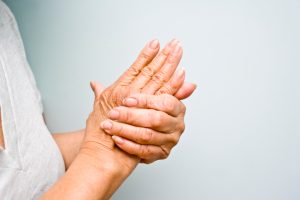Springtime is a great opportunity to get back outside and do the activities you enjoy, but it can also bring the aches and pains of sensitive joints or overexertion. For example, people with inflammatory conditions like rheumatoid arthritis may find that their joints are sensitive to the atmospheric pressure changes that accompany Spring. Rain or humidity can lead to swelling in the affected joint, causing pain and discomfort. There isn’t much you can do about the weather, but there are several ways to manage your symptoms. If you’re in a lot of pain and your joint is swollen and red, try applying ice. If you wake up in the morning feeling very stiff and achy, you may find that using a heating pad helps. Continue reading to learn more about types of arthritis, symptoms, and treatment options.
Types of Arthritis in the Hand Wrist
Osteoarthritis: A degenerative “wear and tear” type of arthritis where the cartilage gradually wears away. This causes bone to rub on bone and can produce bone spurs. Osteoarthritis develops slowly, and the pain increases overtime.
Rheumatoid arthritis: A chronic disease that attacks multiple joints throughout the body. It can affect the same joint on both sides of the body. The synovial membrane that lines the joint begins to swell, which results in pain and stiffness. Rheumatoid arthritis is an autoimmune disease which means the immune system attacks the body’s own tissues and damages the cartilage and ligaments while softening the bone.
Post-traumatic arthritis: A form of arthritis that develops after an injury to the hand or wrist, such as a broken bone or ligament injury. These injuries can cause instability and additional wear of the joints that over time can lead to arthritis.
Psoriatic arthritis: A form of arthritis that affects the joints and skin (psoriasis). This causes your fingers to swell. Joint pain and morning joint stiffness are often reported by those diagnosed with psoriatic arthritis.
Symptoms of Hand Wrist Arthritis
If you have arthritis in your Hand Wrist, you will likely experience pain, stiffness, and associated swelling. Other common symptoms include:
- A burning sensation
- Pain after periods of increased joint use
- Pain and stiffness in the morning
- Pain with rainy weather
- Warmth to the touch
- A grating or grinding sensation
In addition, when arthritis affects the end joints of the fingers (DIP joints), small cysts (mucous cysts) may develop. The cysts can cause ridging or dents in the nail plate of the affected fingers.
Nonsurgical Treatment
Nonsurgical treatment options for Hand Wrist arthritis include:
- Medications. Anti-inflammatory medications, such as ibuprofen and naproxen, can help to reduce joint swelling and pain.
- Splinting. Splinting helps to ease the stress placed on the joint from frequent use and activities. They should be small enough to allow functional use of the hand when worn to avoid muscle deterioration.
- Injections. Injections for Hand Wrist arthritis contain a long-lasting anesthetic and a steroid that can provide pain relief for weeks, or even months.
- Activity Modification. Limiting or stopping activities that worsen the pain is the first step in relieving symptoms.
- Physical Therapy. Your doctor or a physical therapist can help develop an exercise program to improve the range of motion and function in your Hand Wrist.
Surgical Treatment
Surgery methods may be recommended if non-surgical, conservative approaches failed to provide relief. Your doctor will discuss your options and help you decide which surgical procedure is best for you. If the damage has progressed to a point that the surfaces will no longer work, a joint replacement or fusion is performed.
After any joint reconstruction surgery, there is a period of recovery. Length of recovery time varies by individual and depends on the extent of the surgery performed. However, patients can typically return to most normal activities about three months after the procedure.
Schedule an appointment
Your well-being is important to us. Click here or call us at (919)781-5600 to schedule an appointment with one of our orthopedic specialists. If your injury or condition is recent, you can walk right into one of our Raleigh Orthopaedic Urgent Care locations for immediate care. For rehabilitation and physical therapy, no referral is needed to see one of our physical therapists.
– – – – – – – – – – – – – – – – – – – – – – – – – – – – – – – – – – – – – – – – – – – – – – – –
The material contained on this site is for informational purposes only and DOES NOT CONSTITUTE THE PROVIDING OF MEDICAL ADVICE, and is not intended to be a substitute for independent professional medical judgment, advice, diagnosis, or treatment. Always seek the advice of your physician or other qualified healthcare providers with any questions or concerns you may have regarding your health.
